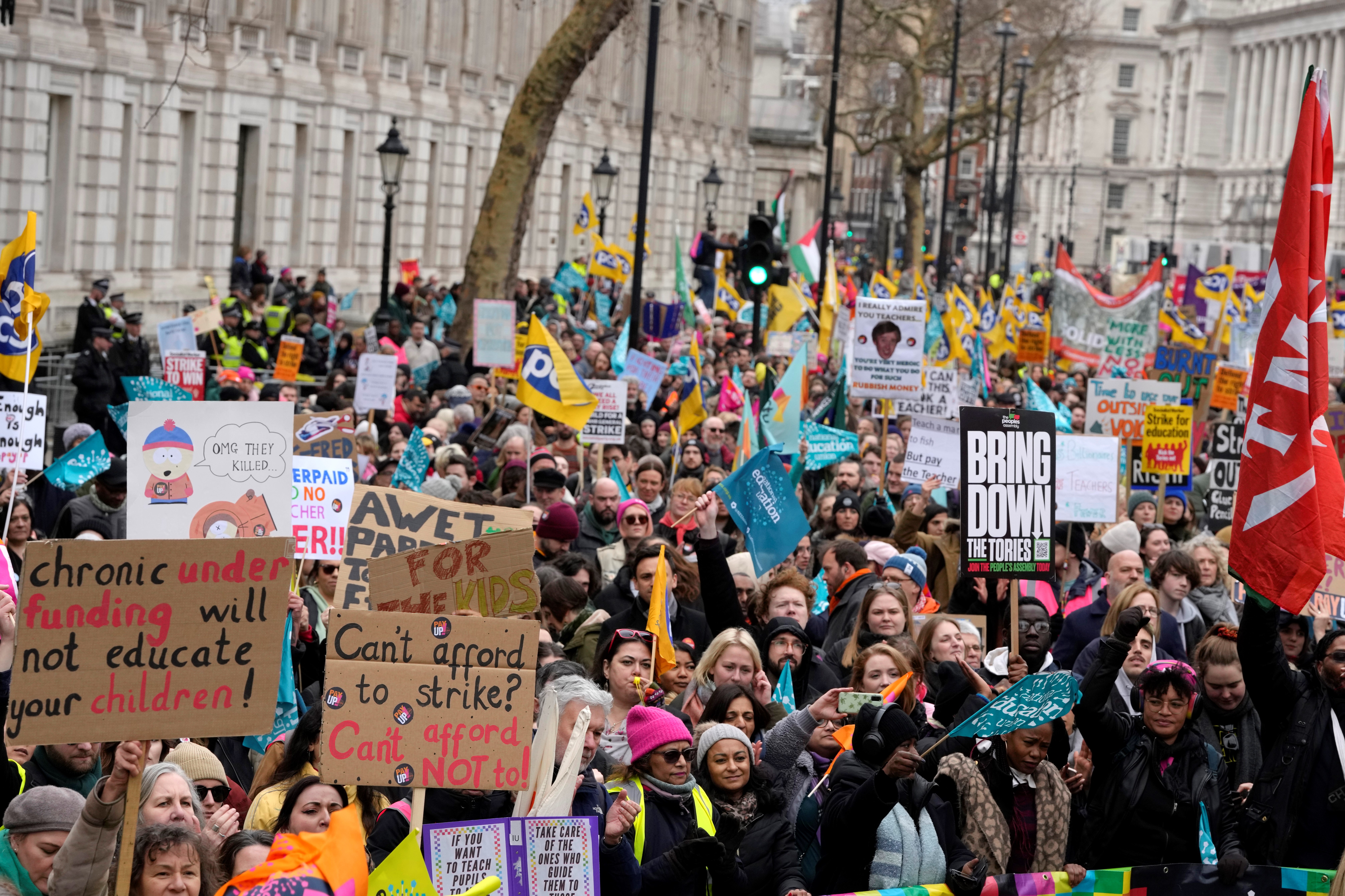About half a million workers demand wage increases in UK
In the largest protest in over a decade, the UK unions announce they're prepared to strike throughout the summer as they demand increased wages amid rising inflation.
-

Thousands of demonstrators wave banners as they stand near Downing Street in Westminster in London, Wednesday, Feb. 1, 2023 (AP Photo/Kirsty Wigglesworth)
In the largest walkout in 12 years, about 500,000 workers in the UK went on strike on Wednesday, disrupting schools and transportation as they demanded increased wages.
The strike occurred a day after the French mass demonstrations, which encompassed 1.27million people. The two demonstrations foreshadow an incoming and possibly inevitable cost-of-living crisis.
The Trades Union Congress (TUC), the overarching labor organization in the UK, considered the protests as the "biggest day of strike action since 2011." The most recent groups to take action included border force personnel at UK air and seaports, as well as teachers, and train drivers.
Absolutely massive demonstration in London with @NEUnion @pcs_union @ucu @ASLEFunion @RMTunion strikers and many thousands of supporters showing their solidarity! The Tories should be very very afraid. #1Feb #Strike #Protest #Resist pic.twitter.com/3PKr9UMrJ4
— Shabbir Lakha (@ShabbirLakha) February 1, 2023
Graham, a union representative who preferred not to disclose his last name, said "We are striking because, for the past 10 years, we had effectively had a pay cut" and explained that "some of our members, even though they are working, still have to make visits to food banks," he told AFP.
The representative further highlighted that "Not only are wages not keeping up, but things like fares, council tax, and rents are going up. Anything we get is eaten away."
In the face of this strike, Education Minister Gillian Keegan expressed disappointment with the teachers' walkout on Times Radio as hundreds of schools were shut for the day.
#TeacherStrike in central #London. They are demonstrating from the BBC to Westminster. They demand better pay. #strikes #UK pic.twitter.com/B2QNUMUFt7
— Alexander Seale (@AlexSeale) February 1, 2023
General Secretary of the Public and Commercial Services Union, Mark Serwotka, said the government's position was "unsustainable". He told Sky News that "it's not feasible that they can sit back with this unprecedented amount of industrial action growing, because it's half a million today."
Serwotka warned that the unions are prepared to hold extended strikes, even throughout the summer and noted that "Next week, we have paramedics, and we have nurses, there will then be the firefighters."
As for British Prime Minister Rishi Sunak, he said on Monday, as he addressed health workers that "Nothing would give me more pleasure than, to wave a magic wand and have all of you paid lots more."
Earlier on January 29, Sunak promised the British parliament that his administration will be restoring economic stability after his predecessor's tax plans triggered market turmoil.
Sunak, since taking on his role as PM, ripped up a number of Liz Truss' policies frustrating the country, in addition to reinstating the ban on fracking and putting under review large-scale deregulation policies in the economy, initially part of Truss' plans.
"We will have to take difficult decisions to restore economic stability and confidence," Sunak told the House of Commons. "We will do this in a fair way."
"I will always protect the most vulnerable. We did it in COVID and we will do it again," he said.
Conservatives perceive Sunak as a "safe pair of hands" in hopes that he will bring stability to the economy heading toward an inevitable recession.
Read more: 1.27 - 2.8 million French protesters march against Macron reform plan

 3 Min Read
3 Min Read










